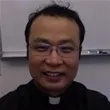Relevance of Religion Albertus Magnus: Science and Faith Embrace Albert the Great

Rev. Jaehwa J. Lee
Bryn Mawr College- 104 Aelwyd on Cambrian Row
Fatherjaehwa@me.com
Haverford College - 208 Whitehead Campus Center
Fatherjaehwa@me.com
Swarthmore College - Bond Hall - 20
jlee3@swarthmore.edu
Sometimes there comes along such a genius that ages to come will wonder that so much knowledge could dwell in one person. Albert was such a man. He was born to German nobility in Swabia, and defied his family when he chose to enter religious life as a Dominican. He studied at the universities of Padua and (for his doctorate) at Paris. He taught at the universities at Cologne, Frieburg, Regensburg, Strasbourg and Paris, where one of his pupils was Thomas Aquinas with whom he developed a life-long friendship and intellectual alliance. He served as theological advisor to the pope, as provincial of the Dominican Order and as Bishop of Regensburg...but teaching was his passion and he resigned everything else to teach again at Cologne.
He was one of the first and among the greatest of natural scientists. He literally 'wrote the book' in biology, chemistry, physics, astronomy and geometry (proving, among other things, that the earth was round) He shares with his contemporary, Roger Bacon, credit for the development of the scientific method. In the liberal arts, he mastered in logic, metaphysics, mathematics, Scripture and theology. He was a scholar of Arabic learning and culture and - with Aquinas - adapted Aristotle (preserved in Arabic) to theology and invented Scholasticism. He was a one-man university and, not surprisingly, was nicknamed Doctor Universalis. His saintly virtue, in all of this, was steadfast humility and an absolute delight in the discovery of the wonders of creation that they might lead all humanity to praise and love the Creator Himself. Late in life, as though finally worn out, his mind began to fail and his body soon followed. He died, one of the greatest minds of his age or any other, at the age of 74 in 1280.
With the Feast of St. Albert the Great (Nov 15) the issue of the Church and science is worth a moment. This is from Galileo's Mistake by Wade Rowland, 2001
Here, in concise form, is what I have characterized as "Galileo's mistake" it is an error that has been understood by philosophers from the eighteenth century onward, from David Hume to Immanuel Kant to Thomas Kuhn, with increasing clarity. The mistake is in the belief that nature is its own interpreter. It is not. Nor is it the case, as Galileo claimed, that "it is not in the power of any created being to make things true or false." It is simply not correct to assert, as Galileo did, that there is a single and unique explanation to natural phenomena, which may be understood through observation and reason, and which makes all other explanations wrong.
Scientists do not discover laws of nature, they invent them. Scientists do not observe "nature in the raw" -- their observations are filtered through layers of subjective impression and social conditioning. Scientific 'facts' about nature are not preexisting truths, they are human constructs, the products of human minds. The models that scientists build to represent what they see in nature are not literal representations of nature, but analogies, metaphors, simulacra. The truth at science 'discovers' is not objective and immutable, ti is subjective and socially contingent. That is why, from time to time, there are 'revolutions' in science that overthrow one complete set of assumptions in favor of another, in the way that Galileo and Newton overthrew Aristotle, and Einstein, in turn overthrew Newton.
(And, my addition: John Mather and Co., with the Big Bang, overthrew the Copernican assertion that the universe has no beginning)
And this runs parallel....
From How the Catholic Church Built Western Civilization, Thomas E. Woods, Ph.D.
Was it just a coincidence that modern science developed in a largely Catholic milieu, or was there something about Catholicism itself that enabled the success of science? Even to raise the question is to transgress the boundaries of fashionable opinion. Yet more and more scholars have begun to ask it, and their answers may come as a surprise.
This is no small matter. The Catholic Church's alleged hostility toward science may be her greatest debit in the popular mind. The one-sided version of the Galileo affair with which most people are familiar is very largely to blame for the widespread belief that the Church has obstructed the advance of scientific inquiry. But even if the Galileo inident had been every bit as bad as people think it was, John Henry Cardinal Newman, the celebrated nineteenth-century convert form Anglicanism, found it revealing that this is practically the only example that ever comes to mind.



